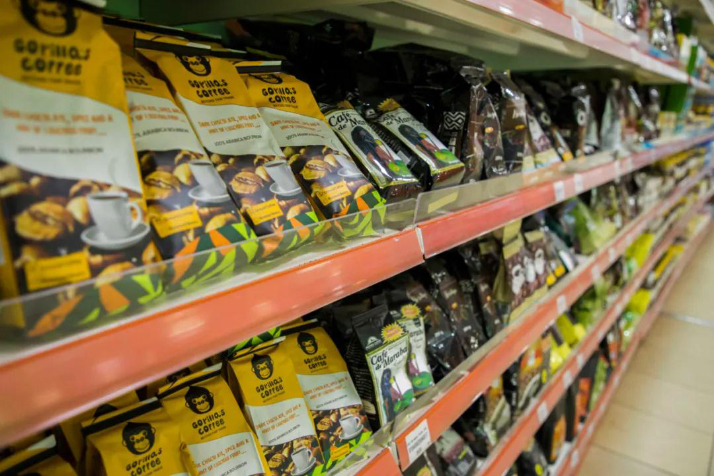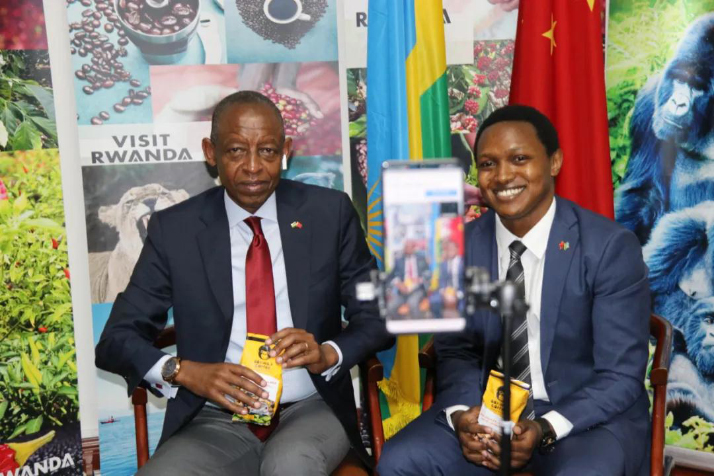|
||||||||||
| Home Nation World Business Opinion Lifestyle ChinAfrica Multimedia Columnists Documents Special Reports |
|
||||||||||
| Home Nation World Business Opinion Lifestyle ChinAfrica Multimedia Columnists Documents Special Reports |
| ChinAfrica |
| Rwanda's coffee beans find their way to the Chinese market through livestreaming platforms |
| As a result of the COVID-19 pandemic, coffee sales in Rwanda have fallen sharply over the last few months and many farmers are facing a difficult situation |
| By Ge Lijun | VOL.12 June ·2020-06-01 |

As a result of the COVID-19 pandemic, coffee sales in Rwanda have fallen sharply over the last few months and many farmers are facing a difficult situation. Luckily, with the help of the Electronic World Trade Platform (eWTP), launched at the initiative of Jack Ma, founder of Alibaba, these people are now able to sell their products directly to Chinese consumers who are eager to buy through e-commerce channels.
Vera Songwe, UN Under Secretary General and Executive Secretary of the Economic Commission for Africa, James Kimonyo, Rwandan Ambassador to China, and Eric Jing, President of Ant Financial Services Group and member of the Board of Directors of Alibaba, were among the participants in the livestreaming event aimed at promoting direct sales between China and Africa.
"Thanks to the elimination of intermediaries between Rwandan farmers and Chinese consumers, our farmers can now earn an extra $4 for each package sold," Kimonyo said.Songwe said it is especially important for the world to continue to trade at a time when countries are closing their borders, because it is the only way to build a prosperous world, as well as a prosperous Africa.

The coffee beans sold during the event were produced by Gorilla's Coffee. "Our sales dropped during the COVID-19 pandemic and our supply chains were disrupted," said David Ngarambe, CEO of the company. The sharp decrease in international flights has also doubled the cost of exporting Rwandan coffee to foreign markets.
"Using the eWTP, Gorilla's Coffee's products are now accessible to more Chinese consumers, and our coffee is also generating enough sales for our company to obtain more reasonable transportation rates," he added. The company works with about 4,000 coffee farmers in six cooperatives throughout Rwanda. According to data from the Rwanda Development Board, coffee planting and processing is one of the pillar industries in the country and a major source of foreign exchange. In total, Rwanda has more than 290 coffee growing cooperatives and about 400,000 farmers engaged in production of the crop.
"Rwandan coffee is among the best in the world and really deserves to be appreciated by our Chinese friends. With the creation of the eWTP by Jack Ma, for the first time in Africa, specifically in Rwanda, coffee farmers have the chance to sell their products directly to the Chinese market," Donatien Niyonzima, a Rwandan PhD student at the Communication University of China, told ChinAfrica.
"The sale of 3,000 packs of coffee in such a short period of time shows that the combination of Chinese e-commerce technology and the hard and swift work of Rwandan coffee producers will serve the Chinese and Rwandan people well. The real value of Rwanda's work will be appreciated by Chinese consumers, who will discover the land of a thousand hills through its coffee," he added.
The eWTP was jointly launched in Rwanda by the Rwandan Government and Alibaba in October 2018 to provide local companies with easier access to new markets through simple and straightforward procedures."Chinese consumers need more good-quality imported products, and the epidemic cannot stop the aspiration and expectations of everyone for a better life. At the same time, we also want to help small and medium-sized enterprises (SMEs) across the globe to restart cross-border trade," said Jing.

Embracing digital economy
This was not the first time that this kind of online sales event was held. In January, more than 2,000 packs of Rwandan coffee were sold in just five minutes during a livestreaming session.
In order to better leverage online platforms to promote Rwandan coffee in China, the Rwandan Embassy in China has worked with a famous Chinese Internet influencer, Xueli Cherie, to sell Rwandan coffee on Taobao, another e-commerce platform of Alibaba.
Livestreaming shopping has been a compelling success in China in recent years, with celebrities and influencers promoting products to their subscribers, allowing viewers to buy what they see on their screen in real time.
By the end of 2019, many Rwandan agricultural products, such as products made from chili peppers, had been sold on Tmall Global and other e-commerce platforms.
In addition, according to Ren Yuan, Chief Director of Alibaba's Globalization Office, the group has also helped Rwanda train its own pool of e-commerce talent. It invited senior government officials, entrepreneurs, small and medium-sized coffee vendors, university professors and students to visit its headquarters in Hangzhou, Zhejiang Province in east China. These activities allowed Rwandan visitors to learn about China's experience with the digital economy.
In September 2019, Alibaba launched its first undergraduate cross-border e-commerce program for African students. A group of 22 Rwandan students were invited to Hangzhou to study for four years.
Since the launch of the eWTP platform in Rwanda, through cooperation in trade, tourism, training and technology, the platform has been helping Rwandan SMEs, entrepreneurs and farmers to play a better and bigger role in globalization. The Alibaba Business School has also provided training programs for Rwandan policymakers, entrepreneurs and students to accelerate the development of their country's digital economy.
"Helping Rwandan agricultural and handicraft products access the Chinese market is the first step. The next step is to help Rwanda create its own e-commerce platform," Ren told China Business Network.
(Print Edition Title: Take Your Coffee Online)
| About Us | Contact Us | Advertise with Us | Subscribe |
| Copyright Beijing Review All rights reserved 京ICP备08005356号-5 京公网安备110102005860号 |